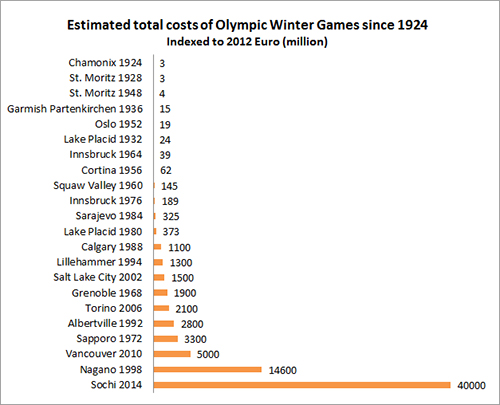Sochi 2014 costs more than the first 90 years of Winter Games
The first Olympic Winter Games took place in 1924 in Chamonix, France. Today, the 22nd edition opens in Sochi. In those 90 years, the Winter Games have grown explosively and more money than ever is involved in the organisation of the Games, both with regards to income and expenses.
When the Russian city of Sochi in 2007 was appointed as host city by the IOC, a budget of around 10 billion US dollar (approx. 7.7 billion euro) was set. The budget was divided with 1.517 billion dollars for the organisation and 8.8 billion dollars for infrastructure and other costs.
According to estimates, this amount has already increased to approximately 40 billion euro, of which the opposition in Russia believes that 20 billion has disappeared through corruption. The organisers argue that a lot of money has been put into infrastructure projects.
Yen, gulden and euro
The gigantic costs for Sochi are unrivaled in the ninety-year history of this event. After studying hundreds of articles since 1924, it appears that more money is spent in Sochi than in all other previous Winter Games put together.
 The estimated costs of all Winter Olympic Games from 1924 to 2010 combined amount to approx. 35 billion euro - less than the Sochi Games.
The estimated costs of all Winter Olympic Games from 1924 to 2010 combined amount to approx. 35 billion euro - less than the Sochi Games.
The research is based on the costs as they were reported in newspapers, reports and surveys at the time: The Austrian Schilling from 1964, the French Franc from 1968 and the Japanese Yen from 1972 – with use of the exchange rate of that time they were all converted into Dutch Gulden in the same era.
Finally, the costs have been converted into the current rate of the euro, in order to make the final sum. For this purpose, a tool on the website of the International Institute for Social History (IISG) is used, which takes the changes in purchasing power and inflation adjustments into account.
Including airports, highways and stadiums
Calculating the total cost of the 1972 Winter Olympics in Sapporo, Japan for example, starts with an article in the regional Dutch newspaper Limburgs Dagblad from February 15, 1972, stating that the total cost of the event was 23 billion yen, equal to 2.3 billion Dutch Gulden. According to the IISG-tool , that amount now corresponds to a purchasing power of 3.25 billion euro. As it is the case with all the included Winter Games, the final cost of the 1972 Winter Olympics is therefore an estimate and not a final sum.
Most important is that the scale of the size of the costs this way becomes visible. Although some Winter Games might have become more or less expensive by this calculation, it will have very little influence on the total sum of 35 billion euro.
The conclusion that the total cost of Sochi 2014 will be higher than all the previous Winter Games combined is therefore plausible – also because this historical research has included all costs such as the organisational costs, and the costs for building airports, highways and stadiums. Finally, as in the case of Sochi, the Japanese airports of 1972 and 1988 and the French motorways of 1968 all are included in the calculations.
Nagano burned all Olympic administrationIn the calculation, we find examples of other exploding budgets, such as the Winter Olympics in 1960 (Squaw Valley, USA), 1968 (Grenoble, France), 1972 (Sapporo, Japan), 1980 (Lake Placid, USA), 1988 (Calgary, Canada) and especially in 1998 in Nagano, Japan.
In Nagano, the complete administration of the event was burned in order to prevent investigations into bribery and corruption! The event was estimated to have cost a total of 15 billion euro (see graph), mainly based on the findings of a research group who in 2006 by order of the local authorities wrote a report on this ‘burned cover-up’.
Even with these considerations, the 2014 Winter Olympics in Sochi manages to exceed the combined costs for the Winter Olympics for the previous ninety years. This is not only visible in the excessive budget of Russian Games, but also in the relative growth of the cost of all the Winter Games since 1924.
The cost of the the prewar Winter Games are tiny, compared to the modern editions (see graph above). All combined the accumulated costs of the former Winter Olympics are still smaller than the cost of the 2014 Winter Olympics in Sochi.
-
Jamie Oliver,
London,
11.02.2014 08:30:
Only Russia and Putin can do this!






